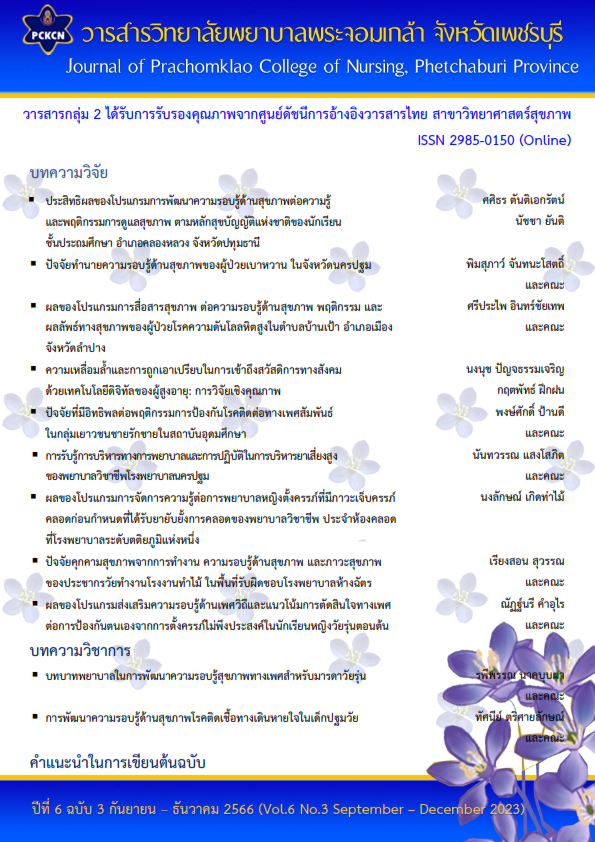การพัฒนาความรอบรู้ด้านสุขภาพโรคติดเชื้อทางเดินหายใจในเด็กปฐมวัย
Main Article Content
บทคัดย่อ
การติดเชื้อทางเดินหายใจเป็นสาเหตุการตายของเด็กปฐมวัย โดยเฉพาะอย่างยิ่งภาวะปอดบวมเป็นสาเหตุการเสียชีวิตอันดับหนึ่งของทั่วโลก ปีละ 2.4 ล้านคน โดยทุกๆนาทีจะมีเด็กอายุต่ำกว่า 5 ปี เสียชีวิตอย่างน้อย 1 คน การพัฒนาความรอบรู้ด้านสุขภาพเกี่ยวกับโรคติดเชื้อทางเดินหายใจที่เหมาะสมกับพัฒนาการของเด็กปฐมวัย จะช่วยลดข้อจำกัดเรื่องการเข้าถึง และเข้าใจข้อมูลด้านสุขภาพ สามารถพัฒนาความรอบรู้ด้านสุขภาพระดับขั้นพื้นฐานของเด็กได้ โดยต้องอาศัยความร่วมมือของทุกภาคส่วน เพื่อลดภาวะเสี่ยงต่อการติดเชื้อโรคทางเดินหายใจในเด็กปฐมวัย
บทความวิชาการนี้ นำเสนอความรอบรู้ด้านสุขภาพ ปัจจัยที่เกี่ยวข้องกับความรอบรู้ด้านสุขภาพ ตลอดจนแนวทางการพัฒนาความรอบรู้ด้านสุขภาพโรคติดเชื้อทางเดินหายใจในเด็กปฐมวัย เพื่อให้บุคลากรสาธารณสุขและบุคลากรที่ผู้เกี่ยวข้องกับการดูแลเด็กปฐมวัย ได้นำไปประยุกต์ใช้ได้อย่างเหมาะสมต่อไป
Downloads
Article Details

อนุญาตภายใต้เงื่อนไข Creative Commons Attribution-NonCommercial-NoDerivatives 4.0 International License.
เนื้อหาและข้อมูลที่เผยแพร่ในวารสารวิทยาลัยพยาบาลพระจอมเกล้า จังหวัดเพชรบุรี ถือเป็นข้อคิดเห็นและความรับผิดชอบของผู้นิพนธ์บทความโดยตรง บทความ เนื้อหา ข้อมูล รูปภาพ ฯลฯ ที่ได้รับการเผยแพร่ในวารสารนี้ ถือเป็นลิขสิทธิ์ของวารสารฯ หากบุคคลหรือหน่วยงานใดต้องการนำทั้งหมดหรือส่วนหนึ่งส่วนใดไปเผยแพร่หรือเพื่อกระทำการใด ๆ จะต้องอ้างอิงวิทยาลัยพยาบาลพระจอมเกล้า จังหวัดเพชรบุรี ทุกครั้ง
เอกสารอ้างอิง
Burns, C. E., Dunn, A. M, Brady, M. A., Starr, N. B., Blosser, C. G., & Garzon, D. L. (2016). Pediatric primary care (6th ed.). Elsevier Health Science.
Capaldi, E. D., & Privitera, G. J. (2008). Decreasing dislike for sour and bitter in children and adults. Appetite, 50(1), 139-145.
Choisuwan, W. (2017). Health literacy: Concepts and applications to nursing practice. Royal Thai Navy Medical Journal, 44(3), 183-197. (in Thai)
Chumai, T. (2016). Growth and development of early childhood children. Hua Hin Medical Journal, 1(2), 18-33. (in Thai)
Department of disease control, Ministry of Public health. (2019). Epidemiological Surveillance Report 2019. https://ddc.moph.go.th/disease_detail.php?d=21 (in Thai)
Department of Health, Ministry of Public Health. (2018). Concepts and principles of a health literacy organization. Project office to drive the Department of Health 4.0 for public health literacy. (in Thai)
Early Childhood Development Act B.E. 2562 (2019). (2019, 30 April). Thai Government Gazette. Vol 136 Part 56A. Pages 5-16. (in Thai)
Fok, M. S., & Wong, T. K. (2002). What does health literacy mean to children?. Contemporary Nurse, 13(2-3), 249-258.
Hockenberry, M. J., Wilson, D., & Rodgers, C. C. (2021). Wong's essentials of pediatric nursing. Elsevier Health Sciences.
Inthakamhaeng, A. (2017). Health literacy: Measurement and development. Sukhumvit Printing. (in Thai)
Khamchuenwong, N. (2020). Early childhood development and emotional foundations for quality growth. https://researchcafe.tsri.or.th/development-and-temperament-of-early-childhood/ (in Thai)
Mathieson, K., & Banerjee, R. (2010). Preschool peer play: The beginnings of social competence. Educational & Child Psychology, 27(1), 9-20.
Myers, L., & Murray, R. K. (2019). Overcoming health literacy barriers to improve asthma inhaler therapy adherence. Annals of the American Thoracic Society, 16(2), 182-186. https://doi.org/10.1513/AnnalsATS.201805-338PS
Nutbeam, D. (2000). Health literacy as a public health goal: a challenge for contemporary health education and communication strategies into the 21st century. Health Promotion International, 15(3), 259-267.
Office of Disease Prevention and Control Region 9. (2022). Report on the situation of important diseases and health hazards for week 9 between 28 February - 6 March 2022. http://odpc5ratchaburi.com/manual/ (in Thai)
Pengchan, W. (2017). Health literacy (Capacity development workshop Department of Health personnel regarding health knowledge towards Thailand). Department of Health, Ministry of Public Health. (in Thai)
Privitera, G. J., Vogel, S. I., & Antonelli, D. E. (2013). Performance on a food health assessment using emoticons with pre-literacy-aged children. American Journal of Educational Research, 1(3), 110-114.
Richter, L., Black, M., Britto, P., Daelmans, B., Desmond, C., Devercelli, A., Dua, T., Fink, G., Heymann, J., Lombardi, J., Lu, C., Naicker, S., & Vargas-Barón, E. (2019). Early childhood development: An imperative for action and measurement at scale. BMJ Global Health, 4(Suppl4), Article e001302. https://doi.org/10.1136/bmjgh-2018-001302
Rothman, R. L., Yin, H. S, Mulvaney, S., Co J. P., Homer, C., & Lannon, C. (2009). Health literacy and quality: Focus on chronic illness care and patient safety. Pediatrics, 124(Suppl3), 315–326. https://doi.org/10.1542/peds.2009-1163H
Safiri, S., Mahmoodpoor, A., Kolahi, A. A., Nejadghaderi, S. A., Sullman, M. J., Mansournia, M. A., Ansarin, K., Collins, G. S., Kaufman, J. S. & Abdollahi, M. (2023). Global burden of lower respiratory infections during the last three decades. Frontiers in Public Health, 10, Article 1028525. https://doi.org/10.3389/fpubh.2022.1028525
Sangthong, C (2018) Situation of health problems, development, and emotional foundations of early childhood children. Thammasat University. https://dric.nrct.go.th/Search/SearchDetail/304754 (in Thai)
Siriwannabut, P. (2020). Developmental psychology. Chulalongkorn University Press. (in Thai)
World Health Organization. (2009, October). Health literacy and health promotion: Definitions, concepts and examples in the Eastern Mediterranean region. In 7th Global Conference on Health Promotion Promoting Health and Development: Closing the Implementation Gap (pp. 26-30). https://www.dors.it/documentazione/testo/201409/02_2009_OMS%20Nairobi_Health%20Literacy.pdf
World Health organization. (2022, 11 November). Pneumonia in children. https://www.who.int/news-room/fact-sheets/detail/pneumonia


